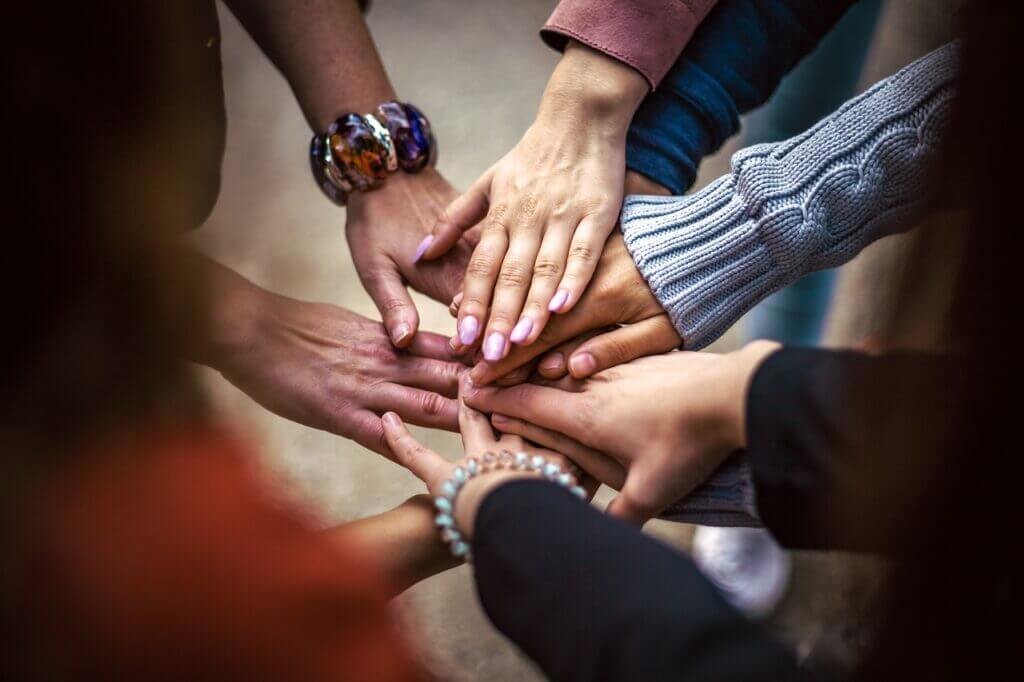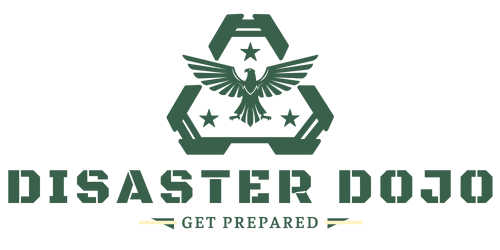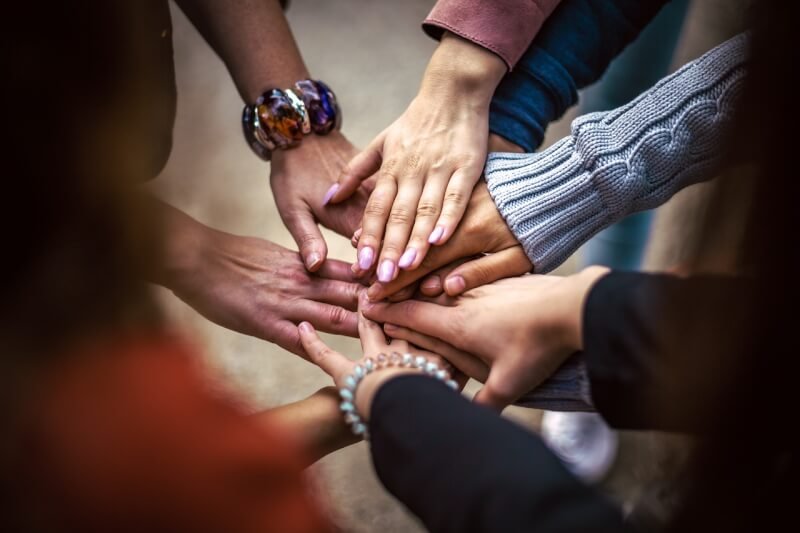Have you ever considered the advantages of joining a community or group prepping effort? In uncertain times, coming together with like-minded individuals can offer a sense of security and preparedness. From sharing resources and knowledge to fostering a sense of camaraderie, community and group prepping brings numerous benefits that go beyond individual preparedness. Discover how this collective approach can not only enhance your survival skills but also build a resilient and supportive network in times of need.

Increased Resources
Pooling of Supplies
One of the primary benefits of community and group prepping is the pooling of supplies. When individuals come together and form a prepping community, they can combine their resources, ensuring a more comprehensive collection of supplies. Each member can contribute their own stockpile of food, water, medical supplies, and other essential items, creating a diverse and abundant inventory. In times of crisis or disaster, this shared pool of supplies can make a significant difference in the group’s ability to withstand and recover from the situation.
Access to Specialized Equipment
In addition to pooling supplies, community and group prepping also facilitate access to specialized equipment. Not every individual prepper may have the financial means or space to acquire certain tools or equipment that are essential for survival in certain scenarios. However, by joining forces with others, the group can collectively invest in and share specialized equipment like generators, water filtration systems, or communication devices. This shared access to equipment ensures that each member of the community has the necessary resources to face a variety of challenges.
Knowledge and Skill Sharing
Community and group prepping also offer the benefit of knowledge and skill sharing. Each individual possesses unique experiences, expertise, and skills that can be incredibly valuable to the group’s overall preparedness. By coming together as a community, individuals can teach and learn from each other, expanding their knowledge base and enhancing their survival skills. Whether it’s first aid, gardening, hunting, or navigation, the collective expertise within the group ensures a more well-rounded and capable community.
Enhanced Security
Strength in Numbers
One of the essential benefits of community and group prepping is the concept of strength in numbers. In times of crisis or disaster, facing challenges alone can be overwhelming. However, when individuals band together, their collective strength and capabilities increase exponentially. A larger group can offer protection, deter potential threats, and distribute the workload more efficiently. With more eyes and ears, the community can identify and respond to potential risks and dangers more effectively, ensuring the safety and security of all members.
Shared Defense Strategies
In addition to strength in numbers, community and group prepping allows for the development of shared defense strategies. Forming a unified defense plan and working together to protect the community’s resources and members is crucial for survival. By leveraging the diverse skills and perspectives within the group, individuals can collaboratively devise intelligent defense strategies tailored to their specific circumstances. This collaborative approach ensures that no stone is left unturned when it comes to safeguarding the community from potential threats.
Improved Surveillance and Monitoring
Furthermore, community and group prepping enable improved surveillance and monitoring capabilities. With more individuals actively involved in the security efforts, it becomes easier to establish a system of vigilant observation. From regular patrols to monitoring communication channels, the group can maintain a heightened level of awareness, detecting any unusual activities or signs of trouble in the area. This enhanced surveillance can provide an early warning system, allowing the community to respond quickly and effectively to potential threats.

Effective Division of Labor
Task Distribution
An effective division of labor is another significant benefit of community and group prepping. When facing a crisis, numerous tasks need to be undertaken simultaneously to ensure the community’s survival. By assigning specific responsibilities to each member based on their skills and expertise, the workload can be distributed efficiently. This ensures that no individual is overwhelmed with multiple responsibilities and that every task is adequately addressed. From food production to medical care to security, a well-organized division of labor maximizes the group’s overall productivity and effectiveness.
Specialized Roles and Responsibilities
In addition to task distribution, community and group prepping allow for the establishment of specialized roles and responsibilities. By recognizing and harnessing the unique strengths of each member, the community can assign specific roles that align with their individual expertise. For example, someone with medical training can take on the role of the community nurse or doctor, while someone with strong leadership skills can assume the position of the group’s coordinator. This specialization ensures that each member can contribute in a meaningful way, optimizing the group’s overall preparedness and response capabilities.
Efficient Utilization of Skills
By bringing together individuals with diverse skills and backgrounds, community and group prepping also enable efficient utilization of skills. Each member can contribute their expertise to the benefit of the entire group. For example, someone with construction skills can help fortify the community’s shelter, while a person with agricultural knowledge can lead the cultivation of crops. This pooling and utilization of skills ensure that the community’s resources are utilized effectively, promoting self-sufficiency and resilience.
Improved Coordination and Planning
Group Decision Making
An important benefit of community and group prepping is improved coordination and planning through group decision making. When multiple individuals are involved in the decision-making process, a wider range of perspectives and ideas can be considered. This collaborative approach ensures that decisions are well-rounded, taking into account the diverse needs and concerns of the community. By involving everyone in the decision-making process, the group can benefit from a more comprehensive and thoughtful planning approach.
Collaborative Emergency Response Plans
Furthermore, community and group prepping facilitate the development of collaborative emergency response plans. By discussing and analyzing potential scenarios collectively, the group can craft detailed and well-thought-out plans of action. These plans can cover various aspects of emergency response, including evacuation procedures, communication protocols, resource allocation, and post-disaster recovery efforts. With input from multiple individuals, these plans are more likely to be comprehensive and adaptable, increasing the community’s chances of successfully navigating a crisis.
Communication and Information Sharing
Effective communication and information sharing are key components of successful preparedness, and community and group prepping foster these practices. By establishing communication channels within the group, members can easily share information, updates, and warnings with one another. This open flow of communication ensures that everyone is on the same page and can respond promptly to any emerging situation. Furthermore, community members can also share valuable external information, such as news updates and local authority announcements, providing a broader perspective on the situation and better informing the group’s decision-making process.

Increased Resilience
Mutual Support and Encouragement
One of the most significant benefits of community and group prepping is the mutual support and encouragement that it fosters. Facing uncertain times and potential crises can be emotionally challenging. However, being part of a supportive community that understands and shares similar concerns can provide a tremendous sense of comfort and resilience. Members can offer each other emotional support, encouragement, and reassurance, creating a strong bond that helps individuals navigate difficulties with greater strength and determination.
Psychological Well-being
Community and group prepping can also contribute to psychological well-being during challenging times. Knowing that you are not alone and that there are others who are invested in your safety and well-being can provide a significant sense of relief and security. Being part of a community that plans and prepares for potential disasters can alleviate anxiety and fear, promoting a healthier mental state. By fostering a supportive and understanding environment, community and group prepping contribute to the overall psychological well-being of its members.
Overcoming Isolation
Another advantage of community and group prepping is the opportunity to overcome isolation. For individuals who have embraced the prepping lifestyle, it can sometimes be challenging to find like-minded individuals who share their concerns and values. However, by actively seeking out and joining a prepping community, individuals can connect with others who understand and share their goals. This sense of belonging and camaraderie helps combat feelings of isolation and allows individuals to form lasting relationships based on a shared commitment to preparedness.
Shared Financial Burden
Cost-sharing for Resources
A significant benefit of community and group prepping is the shared financial burden. Preparing for potential disasters or emergencies can be costly, especially when acquiring essential supplies and equipment. However, by pooling resources and sharing the financial burden, community and group prepping make preparedness more affordable for everyone involved. By collectively contributing funds, each member can access a wider range of resources and invest in items that may have otherwise been financially inaccessible.
Reduced Individual Expenses
In addition to cost-sharing, community and group prepping also lead to reduced individual expenses. By sharing the costs of common supplies, members can save money on purchasing items individually. For example, if each member were to invest in their own water filtration system, it would incur significant expenses. However, by pooling resources and purchasing a high-quality filtration system for the entire community, each member benefits from access to clean water without having to bear the full expense individually.
Pooling of Financial Skills
Furthermore, community and group prepping enable the pooling of financial skills. Within a prepping community, individuals may have varying levels of financial expertise. Some members may excel at budgeting and financial planning, while others may possess investing or money-saving strategies. By sharing these skills and knowledge, the community can collectively make sound financial decisions, ensuring effective allocation of funds for preparedness efforts. This pooling of financial skills promotes not only cost-effective practices but also long-term financial resilience.
Wider Network and Connections
Access to Diverse Expertise
One of the unique benefits of community and group prepping is the access to diverse expertise. Each member of the community brings their own knowledge, experiences, and skills to the table, creating a rich network of expertise. From medical professionals to engineers to survivalists, the collective knowledge within the group covers a wide range of fields. This diversity ensures that the community can tap into a wealth of specialized knowledge when facing different challenges, increasing their overall preparedness and adaptability.
Establishing Relationships with Local Authorities
Community and group prepping also provide the opportunity to establish relationships with local authorities. Collaborating with relevant local organizations and authorities can significantly enhance the group’s preparedness efforts. By openly communicating with local emergency services, government officials, or community leaders, the prepping group can gain valuable insights and access to additional resources. These relationships enable the community to stay informed about local emergency plans, regulations, and resources, ensuring a more coordinated response in times of crisis.
Inclusion in Community Networks
Additionally, being part of a prepping community allows individuals to become included in wider community networks. Prepping groups often participate in community events, outreach programs, or local initiatives. This involvement allows the group to connect with their broader community and establish stronger ties. By becoming active members in the community, the prepping group can gain support and resources from outside sources, fostering a sense of unity and solidarity.
Diverse Perspectives and Problem Solving
Variety of Skills and Backgrounds
Community and group prepping offer the advantage of diverse perspectives and problem-solving approaches. In a diverse community, individuals come from various backgrounds, cultures, and professions. This diversity breeds creativity and innovative thinking, allowing the group to approach challenges from multiple angles. Different skills, experiences, and knowledge can be combined to devise unique and effective solutions to complex problems. By encouraging and embracing diverse perspectives, the prepping community can enhance its problem-solving capabilities and adaptability.
Alternative Approaches to Challenges
Moreover, community and group prepping foster alternative approaches to challenges. When individuals work together, they can explore unconventional methods and solutions that may not have been considered otherwise. By encouraging out-of-the-box thinking, the group can challenge traditional norms and explore creative approaches to preparedness. This ability to think outside the box can be invaluable in situations where conventional approaches may not be feasible or effective.
Creative Solutions
Finally, community and group prepping promote the development of creative solutions. By bringing together individuals with diverse skills and experiences, the group can collectively brainstorm and create innovative solutions to common preparedness challenges. This creative problem-solving approach allows the prepping community to address unique situations or adapt to rapidly changing circumstances. By encouraging creativity, the group expands its repertoire of solutions, ultimately increasing its overall resilience and readiness.
Opportunities for Training and Education
Learning from Experienced Preppers
Community and group prepping present valuable opportunities for training and education. Within a prepping community, there are often individuals who have extensive experience and knowledge in specific areas of preparedness. These experienced preppers can serve as mentors, providing guidance and training to other members. They can share valuable insights, techniques, and lessons learned, helping less experienced members hone their skills and improve their preparedness practices. This transfer of knowledge from experienced preppers to newer members ensures that the community’s collective expertise continues to grow.
Sharing and Teaching Skills
Furthermore, community and group prepping create an environment conducive to sharing and teaching skills. In addition to learning from experienced preppers, individuals within the community can also teach others their own skills and expertise. This culture of skill-sharing allows each member to contribute meaningfully to the group’s overall preparedness. Whether it’s mastering fire-making techniques, navigation skills, or food preservation methods, the community members can benefit from a broad range of skills taught by their peers.
Workshops and Group Classes
Lastly, community and group prepping can organize workshops and group classes to facilitate learning and skill development. By bringing in external experts or utilizing the expertise within the group, the community can host instructional sessions on various topics relevant to preparedness. These workshops can cover a wide range of subjects, from first aid and self-defense to sustainable gardening and off-grid living. By actively promoting and organizing these educational opportunities, the community ensures that its members continue to learn and grow in their preparedness journey.
Social Cohesion and Support
Building Stronger Relationships
Finally, community and group prepping foster the building of stronger relationships within the community. Through shared goals, challenges, and experiences, individuals develop strong bonds and deeper connections with one another. Working together towards a collective goal creates a sense of camaraderie and unity, ensuring that members can rely on one another during times of crisis. This strengthened social cohesion provides a robust support system and a sense of belonging, enhancing the overall well-being and preparedness of the community.
Establishing Trust and Interdependence
Moreover, community and group prepping allow for the establishment of trust and interdependence among members. Prepping communities rely on each other for support, cooperation, and shared responsibilities. Through shared experiences and collaborative efforts, individuals learn to trust one another’s judgment, capabilities, and commitment to the community’s well-being. This trust and interdependence build a strong foundation for effective teamwork and mutual reliance when faced with adversity.
Emotional and Moral Support
Lastly, community and group prepping provide emotional and moral support to its members. Knowing that there are others who share similar concerns and who are actively working towards preparedness can alleviate anxiety and fear. Within the community, individuals can openly discuss their worries, seek advice, and find comfort in the knowledge that they are not alone in their concerns. This emotional and moral support is invaluable during challenging times, providing strength and reassurance to each member.
In conclusion, community and group prepping offer numerous benefits that enhance individual and collective preparedness. From increased access to resources and specialized equipment to improved security and coordination, the advantages of community prepping are clear. The pooling of diverse skills, perspectives, and knowledge enables innovative problem-solving and fosters a sense of resilience. Additionally, the shared financial burden and wider community connections create a supportive environment that promotes psychological well-being. Through training, workshops, and social cohesion, individual members enhance their skills, build relationships, and find encouragement in the face of challenging circumstances. Overall, community and group prepping empower individuals to face uncertainties with a greater sense of readiness and adaptability.


